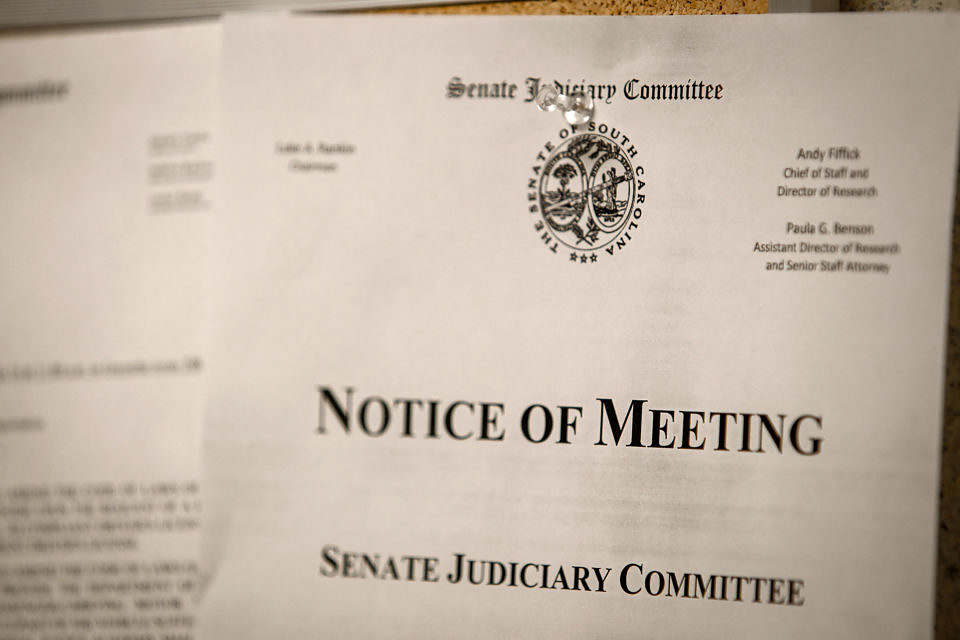|
Getting your Trinity Audio player ready...
|
South Carolina Senate Expected To Advance Judicial ‘Reform’ Bill
Will it constitute meaningful change? Or be another example of ‘reform in name only?’

1 comment
Since no one else commented, you probably would let through this comment of mine which shows your hypocrisy.
You probably believe that no clicks are bad clicks and that, because I am always so darn interesting, my comments engender at least some clicks and induct you and your underlings into INTELLECTUAL high society.
First, your continuing hypocrisy: Pete Strom, who represents you pro bono in return for your promoting his civil lawsuits against all manner of gyms and even prisons, and who is white, has EQUAL POWER on SC JMSC to Todd Rutherford, whom you hate because he is black.
But you say NOTHING about “powerful private lawyers” sitting on South Carolina’s “SC” Judicial Merit Selection Commission (“JMSC”).
Second, in NO parliament IN THE WORLD is it proper to bar a duly-elected representative from a parliamentary committee BASED SOLELY on that representative’s chosen profession and/or avocation.
When you have a legislature of working citizens, there must be equality regardless of the legislator’s business in non-session times.
Third, the real power behind the throne are the “citizens'” committees which are laden with private lawyers WITH NO TERM LIMITS. You never looked into the checkered William Tetterton of Camden, SC, the permanent chair of the Midlands Citizens Screening Committee.
You never did and never would address those.
Fourth, no anonymous complaints against judges are allowed in SC, whether to SC JMSC or to SC’s Office of Disciplinary Counsel (“ODC”).
The problem is the other way: SC JMSC staff make it very difficult for people to file complaints against judicial candidates, require expensive paper exhibits from complainers (even though the process is otherwise done entirely by e-mail and digitally, arbitrarily dismiss serious complaints while letting through complaints from disgruntled inarticulate litigants that end up showing the judicial candidate, no matter his/her real faults, as a victim of idiotic losers, AND play dumb about FOIA requests relative to judges who were allowed to resign instead of being disqualified.
If you don’t believe me, try finding out why D. Craig Brown, formerly an SC Circuit Judge based in Florence, SC, SUDDENDLY retired in his early 50s effective 30 June 2023? He was the toughest sentencer EVER but did so for corrupt reasons. I shall, God willing, dip my proverbial hat to you if you get to the bottom of the D. Craig Brown story OR AT LEAST expose how and why the system is protecting him from exposure.
Fifth, in SC, a governor’s nominations of judges guarantees that no black, minority, or Democrat, would ever be nominated.
You clearly want to make Alan Wilson the future emperor of South Carolina and have yourself as his Rasputin.
See? You stopped pushing for accountability of Becky Hill as soon as Alan Wilson put out a public statement that “it is time to move on” and as soon as her lawyer, Justin Bamberg, started sponsoring you and advertising on your blog.
I was beginning to buy your “starving artist” narrative until your recent cop-outs convinced me you are another paid propagandist for the prosecutors and prison-pushers.
Remember the Cash-for-Kids scandal of Pennsylvania’s judges Michael Conahan and Mark Ciavarella, who were convicted of accepting money in return for imposing harsh adjudications on juveniles to increase occupancy at a private prison operated by PA Child Care?
That is what you and your prison-pushers calling themselves victims’ advocates want for SC.